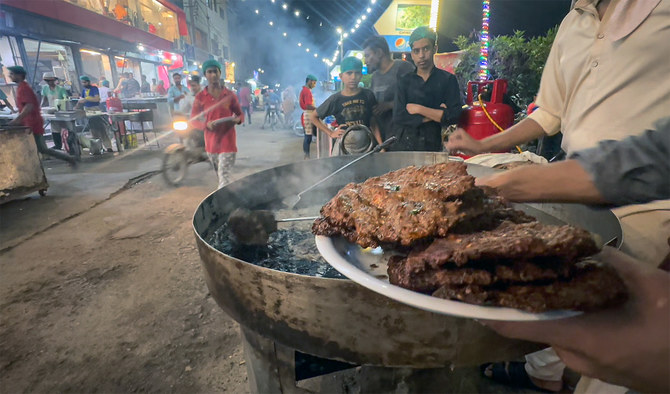KARACHI: Abdul Wahid drops a round mixture of minced meat, maize flour, and spices into a pot sizzling with hot ghee in front of him. A couple of minutes pass before his assistant flips the finished kebabs onto a plate while a waiter attends to eager customers lining up for their takeout orders at a busy restaurant in Karachi.
This is the scene one observes almost every night during the winter season at A-One restaurant in Pakistan’s southern port city of Karachi. Located in the bustling city’s Shah Faisal Colony area, it offers chapli kebabs, a popular staple cooked at roadside stands, sit-down restaurants and homes particularly in northwestern Pakistan and Afghanistan.
Chapli kebabs are meat patties fried with a generous helping of animal fat or oil. The kebabs are mostly made from beef and mutton and are a mix of white cumin, carom seeds, dried coriander, pomegranate seeds, salt, green chilies, and tomatoes. Though the restaurant serves several popular food items such as chicken karahi dish, biryani and fish, A-One in Karachi has gained renown for its chapli kebabs over the years.
“It [A-One] is famous for chapli kebab, which is our primary specialty,” Wahid told Arab News, noting that over the years, additional cuisines were later introduced to the menu.
A-One occupies a large space now but the restaurant used to be a small shop in the ‘80s when it started.
“Our Mr. Hajji Gohar Rahman, he started with a small shop,” Gul Muhammad Khan, the restaurant’s manager, told Arab News. “First of all, [the biggest success factor] is Allah’s Grace, then his honesty, and then his hard work gave us an entire complex of Peshawari chapli kebabs.”
The first chef of the restaurant, 95-year-old Saeed Khan, brought the popular original chapli kebab recipe from Pakistan’s northwestern Peshawar city, said Khan.
“This is our original recipe; it’s Peshawari,” he added.
Abdul Wahid, the current chef, said what separates A-One’s chapli kebabs from the ones offered at other eateries, is that they are made from high-quality meat.
“We use the meat of the leg only,” Wahid told Arab News. “We use high-quality, hygienic meat, which is why the quality that we started with hasn’t changed.”
Despite being a dish traditionally associated with Pakistan’s ethnic Pashtun community, people of various ethnicities savor chapli kebabs at the restaurant, praising its authentic taste.
“People from every community eat,” Gul Muhammad Khan, the manager, told Arab News.
“Their friends bring them here specifically to introduce them to a new taste, and those who eat, really enjoy it.”
Zahid Jamal, a frequent customer, selected the venue to celebrate his daughter Safiya’s birthday this weekend.
“Today is my daughter Safiya’s birthday, so we thought about going out for dinner,” Jamal told Arab News. “We decided to go to A-One as its chapli kebabs are very famous. So, we came here and enjoyed our meal. It was very good.”
Another regular customer, Aimen Azam, said she regularly sends an uncooked blend of kebabs to her brother in Dubai.
“Last month, I sent some uncooked chapli kebabs to my brother in Dubai,” Azam told Arab News. “I sent him about 6kg in uncooked form last month, and he had it with his friends there.”















